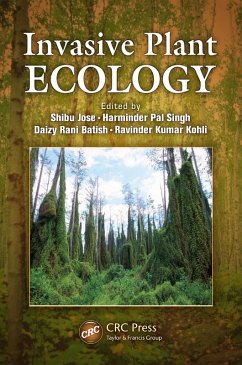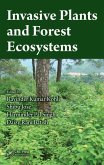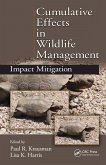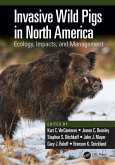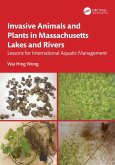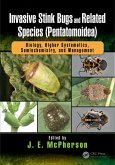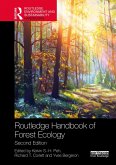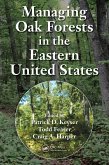Invasive Plant Ecology (eBook, PDF)
Redaktion: Jose, Shibu; Kohli, Ravinder Kumar; Batish, Daizy Rani; Singh, Harminder Pal


Alle Infos zum eBook verschenken

Invasive Plant Ecology (eBook, PDF)
Redaktion: Jose, Shibu; Kohli, Ravinder Kumar; Batish, Daizy Rani; Singh, Harminder Pal
- Format: PDF
- Merkliste
- Auf die Merkliste
- Bewerten Bewerten
- Teilen
- Produkt teilen
- Produkterinnerung
- Produkterinnerung

Hier können Sie sich einloggen

Bitte loggen Sie sich zunächst in Ihr Kundenkonto ein oder registrieren Sie sich bei bücher.de, um das eBook-Abo tolino select nutzen zu können.
Comprising a series of essays from botanical experts across the globe, this reference presents a comprehensive examination of the problem of invasive plant species and their impacts on different ecosystems. Through examination of ecological theories that explain plant invasions, it provides a foundation in invasion ecology. Contributors discuss the role of ecological attributes such as plant life history and fire and management practices with respect to plant invasion. The book examines the physiological basis for invasive species success and gives ecological management and restoration guidelines for invaded areas.…mehr
- Geräte: PC
- mit Kopierschutz
- eBook Hilfe
- Größe: 14.22MB
![Invasive Plants and Forest Ecosystems (eBook, PDF) Invasive Plants and Forest Ecosystems (eBook, PDF)]() Invasive Plants and Forest Ecosystems (eBook, PDF)192,95 €
Invasive Plants and Forest Ecosystems (eBook, PDF)192,95 €![Cumulative Effects in Wildlife Management (eBook, PDF) Cumulative Effects in Wildlife Management (eBook, PDF)]() Cumulative Effects in Wildlife Management (eBook, PDF)65,95 €
Cumulative Effects in Wildlife Management (eBook, PDF)65,95 €![Invasive Wild Pigs in North America (eBook, PDF) Invasive Wild Pigs in North America (eBook, PDF)]() Invasive Wild Pigs in North America (eBook, PDF)61,95 €
Invasive Wild Pigs in North America (eBook, PDF)61,95 €![Invasive Animals and Plants in Massachusetts Lakes and Rivers (eBook, PDF) Invasive Animals and Plants in Massachusetts Lakes and Rivers (eBook, PDF)]() Wai Hing WongInvasive Animals and Plants in Massachusetts Lakes and Rivers (eBook, PDF)162,95 €
Wai Hing WongInvasive Animals and Plants in Massachusetts Lakes and Rivers (eBook, PDF)162,95 €![Invasive Stink Bugs and Related Species (Pentatomoidea) (eBook, PDF) Invasive Stink Bugs and Related Species (Pentatomoidea) (eBook, PDF)]() Invasive Stink Bugs and Related Species (Pentatomoidea) (eBook, PDF)91,95 €
Invasive Stink Bugs and Related Species (Pentatomoidea) (eBook, PDF)91,95 €![Routledge Handbook of Forest Ecology (eBook, PDF) Routledge Handbook of Forest Ecology (eBook, PDF)]() Routledge Handbook of Forest Ecology (eBook, PDF)45,95 €
Routledge Handbook of Forest Ecology (eBook, PDF)45,95 €![Managing Oak Forests in the Eastern United States (eBook, PDF) Managing Oak Forests in the Eastern United States (eBook, PDF)]() Managing Oak Forests in the Eastern United States (eBook, PDF)48,95 €
Managing Oak Forests in the Eastern United States (eBook, PDF)48,95 €-
-
-
Dieser Download kann aus rechtlichen Gründen nur mit Rechnungsadresse in A, B, BG, CY, CZ, D, DK, EW, E, FIN, F, GR, HR, H, IRL, I, LT, L, LR, M, NL, PL, P, R, S, SLO, SK ausgeliefert werden.
- Produktdetails
- Verlag: Taylor & Francis
- Seitenzahl: 302
- Erscheinungstermin: 9. Januar 2013
- Englisch
- ISBN-13: 9781439881279
- Artikelnr.: 40066595
- Verlag: Taylor & Francis
- Seitenzahl: 302
- Erscheinungstermin: 9. Januar 2013
- Englisch
- ISBN-13: 9781439881279
- Artikelnr.: 40066595
- Herstellerkennzeichnung Die Herstellerinformationen sind derzeit nicht verfügbar.
plants so successful? Exploration of the ecological basis. Novel weapon
hypothesis for the successful establishment of invasive plants in alien
environments: A critical appraisal. Functional basis for geographical
variation in growth among invasive plants. Aboveground-belowground
interactions: Implication for invasiveness. From species coexistence to
genotype coexistence: What can we learn from invasive plants? Mycorrhizae
and invasive plants. Exotic plant response to forest disturbance in the
western United States. Effects of silvicultural practices on invasive plant
species abundance in the Missouri Ozark forests of the central United
States. Invasive plants and mutualistic interactions between fleshy fruits
and frugivorous animals. Alien plant invasion and its ecological
implications: An Indian perspective with particular reference to
biodiversity-rich regions. Impact of invasive alien plant species on
aboveground and belowground diversity in the Kashmir Himalaya, India.
Ecology and management of invasive plants in Africa. Geospatial tools for
identifying and managing invasive plants. Improving restoration to control
plant invasions under climate change. Converting invasive alien plant
stands to natural forest nature's way: Overview, theory, and practice.
Economics of invasive plant management. An economic analysis of the
invasive plant problem associated with the horticulture industry in North
America. Index.
plants so successful? Exploration of the ecological basis. Novel weapon
hypothesis for the successful establishment of invasive plants in alien
environments: A critical appraisal. Functional basis for geographical
variation in growth among invasive plants. Aboveground-belowground
interactions: Implication for invasiveness. From species coexistence to
genotype coexistence: What can we learn from invasive plants? Mycorrhizae
and invasive plants. Exotic plant response to forest disturbance in the
western United States. Effects of silvicultural practices on invasive plant
species abundance in the Missouri Ozark forests of the central United
States. Invasive plants and mutualistic interactions between fleshy fruits
and frugivorous animals. Alien plant invasion and its ecological
implications: An Indian perspective with particular reference to
biodiversity-rich regions. Impact of invasive alien plant species on
aboveground and belowground diversity in the Kashmir Himalaya, India.
Ecology and management of invasive plants in Africa. Geospatial tools for
identifying and managing invasive plants. Improving restoration to control
plant invasions under climate change. Converting invasive alien plant
stands to natural forest nature's way: Overview, theory, and practice.
Economics of invasive plant management. An economic analysis of the
invasive plant problem associated with the horticulture industry in North
America. Index.
